MUD, MISERY AND MACHISMO : BA THEN AND NOW
Since this blog is currently supposed to be doubling as a kind of travelogue, it is time that I wrote something on my first month in South America. I apologise for the lack of original photos - I am trying to find a British adaptor so that I can charge my camera up, without, thus far, much luck.


It is difficult to overstate how little I have done so far. Apart from brief trips to Bariloche and Colonia (which I had been to before) I have stated in BA for well over a month. When fellow travellers hear that I have stayed in one place, reading, drinking coffee (and, I must confess, one or two beers), and generally avoiding the tourist traps, it is with some disbelief. Why would I choose to spend nearly one fifth of my trip in such a state of inactivity?
Well, firstly I have been here before. I have enjoyed the surrealism of the cemetery at Recoleta ; I have walked round the Casa de Rosa in the Plaza de Mayo and seen the balcony from which Evita gave her speeches ; I have done day-trips to Tigre, and I have ballsed up the tango. I feel no great need to do any of these again. Secondly, I am not much of an adrenalin junkie - I actually really like doing nothing - it is the way to get to know a place. And thirdly - and this is where people go "Ah, of course!" and slap my back knowingly - I have met a rather lovely young chica, a Colombian with whom I have spent lots of time (including Christmas and New Year) during the last three weeks or so. (It is remarkable how women can change your travelling plans.) Kelly speaks no English at all, which has made it, in at least one way, the most interesting relationship I have been in. My last post suggested that love is a master signifier, an empty space, a nothingness into which two people plunge. When those two people literally struggle to understand each other, the black hole becomes all the more obscure, and when you are in a state of obscurity, you cannot very well ask the sort of damaging internal questions that usually beset a relationship. The first question I asked myself when it became apparent that Kelly liked me was : why? She cannot speak my language, I can barely speak hers ; how can you like / love / whatever somebody with whom you cannot talk? I put the thought out of my mind when I discovered the answer : far more easily than somebody with whom you are bound to talk too much. (And besides, she is damned hot.)
That said, we have had some cracking conversations (and barneys), all helped by her patience with my broken Spanish (which has nevertheless improved a lot). She is studying film in BA, and her favourite director is Hitchcock - an excellent start. The people in South America I have spoken to - all lower-middle-upper-working class - seem far better educated than people in Europe or the US. I tried to bullshit my way through a conversation about Spinoza, but I was quickly found wanting, the difference being that Colombians actually study philosophy as a matter of course at school. I have seen Marx being read by several people on the subte ; Daniel Barenboim chose to perform a free new year concert not in London or New York or Paris, but in the Avenida 9 de Julio (the widest street in the world) ; on every street corner there is a kiosk selling psychoanalytic journals (you have to sift through the porn to get to them) - and what´s more, people actually buy and read them! I have never been to a city which absorbs the cultures of other countries so much, while remaining intensely proud of its own - hence why Barenboim chose to conduct a philharmonic orhcestra playing lost and familiar tango classics.
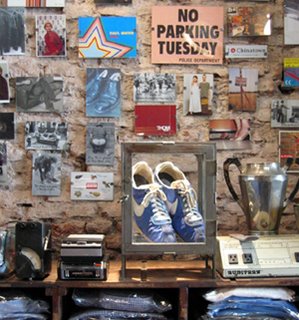
And yes, BA is the world capital of Lacanian psychoanalysis. I won`t dwell on this too much (the old man is still turning in his grave after my portentous last post), but my first question on learning this was : does this mean porteños are saner as a result, or a priori bonkers and therefore more needy of help? A stupid question, but perhaps it is related to the style of relationships in South America. Machismo rules, of course, and there are plenty of sins committed in its name (another case of which-comes-first : is Catholicism big because they fuck around so much, or is the serial adultery a product of needing to have something to repent?). Reading Lacan, I have never quite felt as though he`s talking about my life. If I hung around BA for much longer, maybe I would.
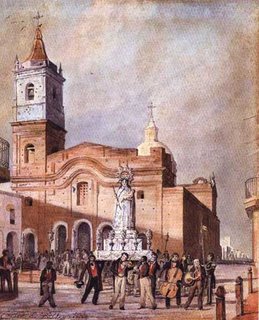
But `twas not always thus. BA began as a neglected embarrassment for the Spanish crown. We have seen already how the early Spanish pirates were intent on raping their new-found colony of its abundant riches. "The corrupt," said the Indian politician Juan de Solórzano Pereyra in 1647, "are greater and more insolent sinners than thieves, as these steal in fear, while the former do so openly and securely."
The early years (not to mention the latter) of the Spanish Empire were marked by theft on a colossal scale. Of course, larceny is implicit in imperial capitalism, but it was exacerbated by Spain´s kamikaze policies on imports and exports. The source of much of the riches was Potosi, in present-day Bolivia, where in 1545 the Spanish had discovered vast reserves of the highest quality silver. The rush to mine these reserves dry turned Potosi into a death-camp. Felipe Pigna states that during the late sixteenth century, "both the amount of silver recovered from the ore and the exploitation and death rate of the Indians doubled." Because of this decline in the Indian population, Potosi became the new home for millions of black slaves. Fray Tomas Mercado, who witnesses the transfer of many slaves from Africa to America, describes the journey :
They travel so closely packed together, so filthy and battered, that those who bring them have assured me that they travel in groups of six, yoked and shackled in pairs, so that they are chained from head to toes, transported below deck, locked from the outside, where neither the moon nor the sun will shine, where no Spaniard dare poke his head in unless forced to, nor remain longer than an hour without a serious risk to his health, such is the stench, the crowing and the misery of the place. And their only solace is what they are given to east only once a day, not more than an average bowl of corn flour or raw millet, which is to them like our rice, with a small jar of water ; that and the regular beatings, whippings and cursing. This is the usual procedure.
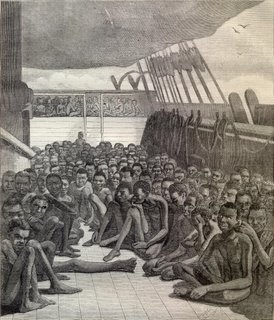
But who would gain from these riches, and who (aside from the wretched slaves) would lose? We have to bear in mind that the capitalists and masters of the early Spanish Empire were not united in how the profits of their new-found treasures should be distributed. Merchants from Seville decreed that all exports from Latin America must flow via Lima - this would maximise profits and commissions for partners in both cities. But this left BA, whose genesis was pretty much solely the result of the riches at Potosi, in limbo, for imports also had to flow via Lima. As can be imagine, en route from Lima to BA, prices got hiked to such an extent that the inhabitants of BA hadn`t a hope in hell of affording them.
Contraband, therefore, became the first fully fledged industry in Buenos Aires. BA pirates and smugglers became locked in a deadlock with the Spanish Crown, which eventually decreed that all trade to and from BA was illegal unless its journey was to or from Seville, via Peru. In effect, this closed the newly established port of Buenos Aires down altogether.
However, there was a loophole in the law which the pirates exploited to its maximum (legal loopholes remain a favourite in Argentina). The Crown`s decree stated that any illegal traffic into Buenos Aires must be immediately stopped, and its contents immediately sold. And so, a bunch of entrepenuerial porteños decided they could make a few bob by ambushing Portuguese ships, and immediately selling on their products (including large quantities of slaves). The stability of Buenos Aires was further compromised by a threat that, if the virtual trade-ban on the city wasn`t lifted, its inhabitants would desert en masse.
To sort out this mess, enter Hernando Arias de Saavedra (known to his mates as Henandarias, and why not?). He was clever enough, in appealing to the Spanish Crown to re-open Buenos Aires, to know which buttons to press. Aware of the impending anarchy in BA, Henandarias wrote to the King that if the status quo was maintained, the inevitable unrest might lead to an invasion of Potosi. And, as we know, Potosi was the holy grail for the Spanish Crown. This appeal had some success : in 1602 the port was reopened for imports, but exports were limited to a few piddly bales of wheat and some meat to Brazil. Henandarias saw this as the silver lining which might enable him to root out the curse of smuggling in his city.
But, following his departure as Governor of the province, the city of BA fell once again into the hands of the professional pirates, especially when a group led by Don Diego and Simòn de Caldez, who deployed an international team of racketeers to mop up the profits gained by nicking Portuguese commodities, became influential in the Cabildo (the Argentinian house of government). The Cabildo (whose building still exists in truncated form) was a body made up of men selected by outgoing incumbents ; it was in no way democratic. Thus began a battle between one set of pirates (the Confederates, led by Diego and Valdez) and another (the so-called Worthies, who saw piracy as an obstacle to their own, more legal profiteering) to attain majority rule in the house. All manner of rackets, bribes and death-threats accompanied this battle (one wonders if, in 400 years time, bloggers will be describing similar goings-on in 21st century sites of mud and misery - New Orleans and Baghdad spring to mind), with the general population utterly powerless to do anything. The Confederates temporarily gained control by buying posts, but were soon replaced by the Worthies, etc etc, ad infinitum.
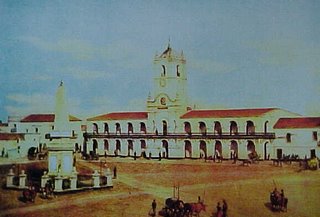
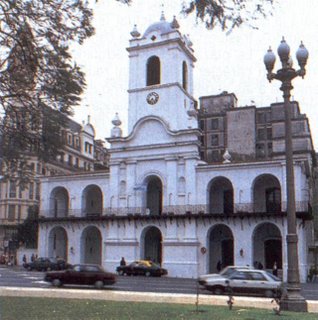
THE CABILDO, THEN AND NOW
The scourge of empire and capital still besets Buenos Aires - poverty is far more visible than in London, and more marked. It is not at all uncommon to see street-kids of 5 and 6, who are clearly suffering from heroin-addiction. The crash of 2001 (again caused by an unpopular free-market economic system being foisted upon a population whether they liked it or not) plunged 50% of Argentinians into poverty, and the recovery has been slow.
I shall probably write one more post from Argentina before I go to Bolivia. I must, at least, say a few words about the steak here. But if you are itching to read about Bolivia, let me recommend this excellent article, from a person working and living in Cochabamba, where I plan to spend three or four weeks in February, again living and working.
But it`s hasta luego from me for now...

0 Comments:
Post a Comment
<< Home